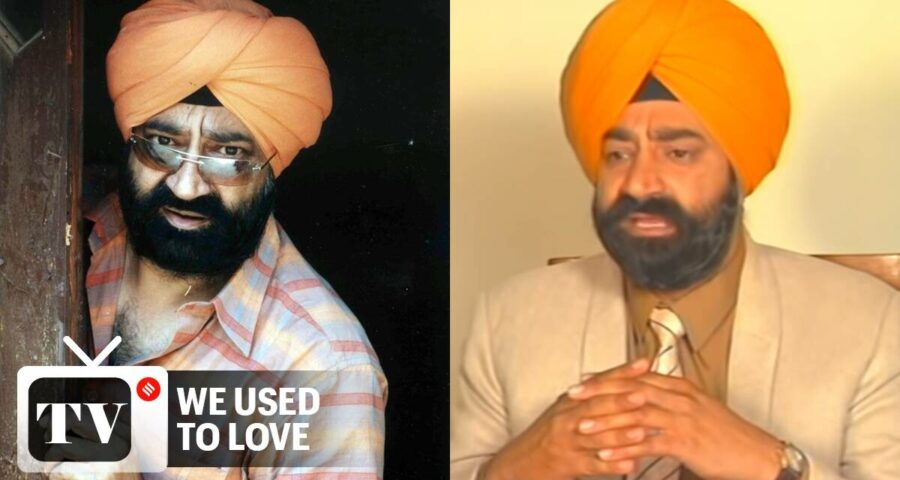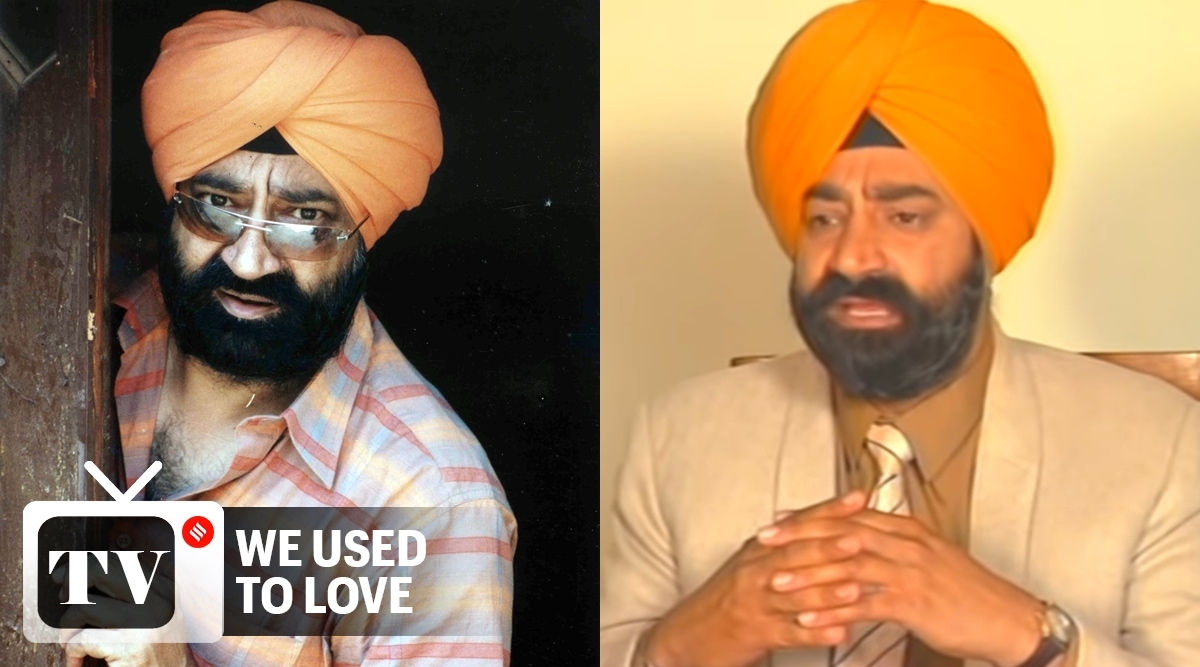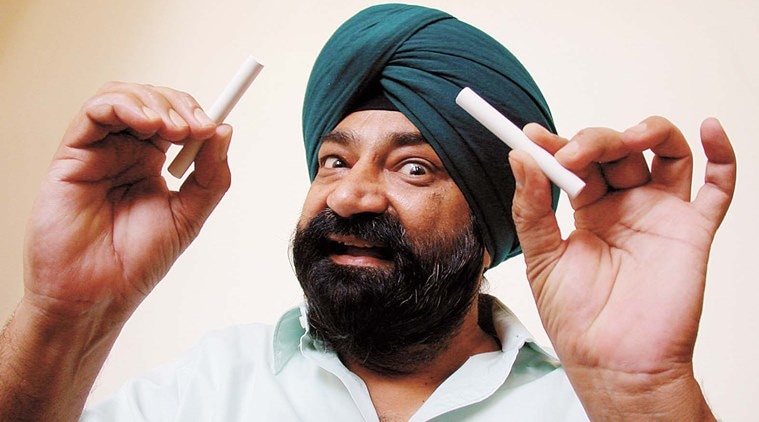Every month, the TV We Used To Love series will rewind to the Doordarshan shows of 1980s and 90s, an era remarkable for its rich television. We are starting with the late Jaspal Bhatti's ten episoder Flop Show, a witty send-up of the great North Indian middle-class archetypes.
Ask the bae generation about Jaspal Bhatti, and it is likely their response will be a question mark. Before Navjot Singh Sidhu, Mr Bhatti was the ubiquitous turbanator-in-chief who revolutionised comedy on Indian television. However, unlike his incurably gabby successor, he was no ‘Laughing Sardar.’ Dour and dry, he had a rather serious mien. Seldom even he smiled, leaving all the chuckles to where it mattered the most — the audience. Starting with the 1980s all the way through 1990s, when state satellite was all Indian couch potatoes had in the name of TV entertainment, Doordarshan ruled the tube and one man reigned supreme when it came to laughter.
Jaspal Bhatti’s Flop Show (1989) wasn’t just any other sitcom. With its acerbic writing and ridiculous yet relatable situations, it was a caustic satire that exposed all the flaws, frailties and eccentricities that ailed the booming North Indian middle-classes. The show recently made a comeback to DD National to lighten the mood of a populace nearly coming to its tether’s end after months of Covid lockdown. Few urbanites tune into Doordarshan anymore, but even in the age of Kapil Sharma, AIB comedy roasts, Netflix originals and the current trend of stand-ups and open mics, Flop Show’s mordant satire holds out as sui generis. In episode after episode, it reminded us what good humour was all about and how it could be achieved with the gentlest of touch, sneakiest of jab and sharpest of sting.
Madhouse Magic
From the tongue-in-cheek disclaimer at the start (‘This episode is dedicated to those influential people whose trivialities result in another big meeting’), the orchestra-style opening and quirky closing credits to the finale often ending with a doggerel, Flop Show tirelessly campaigned against what was wrong with the system. Take, for example, the rip-tickling episode titled ‘Meeting.’ It lampoons the governmental practice of addressing a ‘meeting’ which gives the committee a fresh opportunity to call for another meeting, thus never resolving the issues for which the first meeting was called in the first place. True to form, Jaspal Bhatti plays a character named Jaspal Bhatti, the official of a government firm notorious for a frustratingly slow work culture. Productivity is zilch here, even though the “entire country is in a meeting.” The cast is populated by a familiar ensemble, who turn up in each episode playing a caricature of some real-life archetype you may have seen somewhere. Of these, the prominent ones were the late comedian Vivek Shauq, often reappearing as Bhatti’s friend or superior and Savita Bhatti, the lynchpin’s wife and co-conspirator. If you haven’t ever seen an episode of Flop Show (there are only ten), ‘Meeting’ should be a good place to start. It’s a madhouse. Savita plays Preeti, a suspicious housewife who is fed up with her maid. Sounds familiar? Her work is fine but she’s lousy at breaking neighbourhood gossip, complains the mistress. Vivek Shauq appears as a pipe-smoking manager desperate to get his file cleared. Caught between a hectoring wife and demanding boss, add the very enterprising office rodents who are giving Mr Bhatti sleepless nights!
Most episodes are, broadly, on the same lines. And just as hilarious. In particular, sleepy babus, servile secretaries, public administrations, corrupt builders, medical mismanagement and middle-class mannerisms are the butt of jokes. Bhatti spends his time as a henpecked husband fending off crises, whether it is searching for a precious watch (his father-in-law’s gift) or his wife’s missing pet. One episode draws to an end with a Bollywood qawwali parody between contractors and engineers. Another is a send-up on property encroachment. One of the funniest moments comes in the first episode itself. Bhatti plays an “experienced chief guest” who starts his speech by saying things like, “Sorry for being only one hour late today. Usually, at any function, I’m at least one and a half hour late.” In the Bhatti-verse, even a new telephone line (a legit cause for celebration for ’90s families) was enough to generate some timely LOLs. Sample this comic gold: Man: ‘Number toh bohot badhiya hai.’ Bhatti: ‘Kyun? Iss number pe bill nahin aata?’ One spoof on a famous patriotic song goes, ‘Ghoome boss ki biwi caron mein, khada baki staff qataron mein/Yahan sote hain babu susti mein, kare ghar ke kaam woh chusti mein.’ A former teacher, Savita Bhatti gets her best line when, elated at receiving a bribe, she pressures her upright husband to accept the suitcase full of cash:”Tankha toh aapko office jaane ki milti hai, kaam karne ke paise toh aaj aapko mile hain.” Hailing from an air force background, Savita was no actress but when Bhatti the Ringmaster turned the camera on her, she went along for the ride. Under her husband’s mis-direction, Flop Show captured the ’90s Punjabi zeitgeist that today, looking back, seems like simpler times. And simpler times deserved simple humour. Jaspal Bhatti’s material was neither obscene nor hurtful. For that bawdy style, you have the streaming sites: Sacha Baron Cohen’s no-filter mockumentaries or AIB’s toilet humour, take a pick.
Satirist Supreme
Satire can be a tricky business. How to make a joke without sounding too message-y or preachy? A harmless comedy that can be turned into a meaningful reflection of the world around us was something that RK Laxman successfully offered in his searing cartoons, and a film like Jaane Bhi Do Yaaro did through its sharp observation of a corrupt society where the only good people left in the hellhole are two bumbling photographers (Naseeruddin Shah and the late Ravi Baswani), good for nothing but eventually found to be good for something.
If Jaspal Bhatti’s humour sometimes resembled that of a cartoonist’s, it is because he was one. His trick was to combine middle-class aspiration and pretension, with an exceptional gift to reach for this so-called genteel strata’s underbelly. His comedy arose from the everyday situation. It may have happened to us, in a dusty government office with a bureaucrat lobbying for kickback or the neighbourly tittle-tattle but while we laughed along and moved on, Bhatti was the only one who cared to note it down, then exaggerate and distort it and voila, it’s fit for TV. He never ran out of satirical steam because his primary subject — the great Indian middle-class — never stopped supplying him with fresh fodder. At a time when DD had such quipsters as Pankaj Kapur, Satish Shah, Deven Bhojani, Bhavana Balsavar, Shafi Inamdar, Swaroop Sampat, Rakesh Bedi, Ratna Pathak Shah, Supriya Pathak et al, Jaspal Bhatti stood out with his unique brand of comedy. He would have continued his creative run had tragedy not struck. In 2012, the comedian lost his life in a car crash, shocking friends and fans alike. If alive today, you can bet Mr Bhatti would have interpreted the current news cycle through his own loopy lens. The pandemic, social media, plummeting economy, Modi government, cow cabinets, Trumpism, fake news, Bollywood nepotism and so much more. He would have had such a field day.
Flop Show was a certified hit and Bhatti followed its success with the farcical Full Tension and Mahaul Theek Hai, building on the same middle-class motifs that made him popular. Around the same time, he also acted in Rishi Kapoor’s Aa Ab Laut Chalen, playing an Indian sparring partner to the Pakistani cabbie essayed by veteran Kader Khan. He went, as they say, with his boots on. It was while promoting Power Cut, a Punjabi film also starring his wife Savita and son Jasraj Bhatti, that he met with a fatal accident. Even in a truncated career, Bhatti left his influence on a new generation of comedians, like Sunil Grover and Bhagwant Mann. Decoding his mentor’s comic appeal, Mann attributed his popularity to the way he connected with the masses and his own intimate knowledge of the issues that the common man faced day in and day out. “His satire went beyond comedy. It was always a statement. A powerful voice against the system seeped in corruption, inequality and circumferenced by social evils,” Mann wrote in The Quint.
Wife Savita Bhatti, who never spares an opportunity to perpetuate the satirist’s legacy, once referred to him as Indian comedy’s ‘Sardar-E-Azam.’ You can imagine the self-effacing Sardar shrugging off that compliment, instead turning the joke on himself. Anyone remembers the last Flop Show sketch where a character counsels him to invest in a tragedy instead of comedy? Defying him, the funny-man ventures out to make an out-and-out comedy only to take a potshot at himself in the end. A family watching Flop Show is shown deeply regretting this prime time experience, nearly smashing their colour TV set. In reality, though, it was the opposite.
Flop Show is on Doordarshan National’s YouTube channel.
Source: Read Full Article



